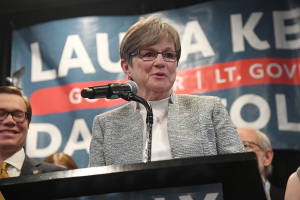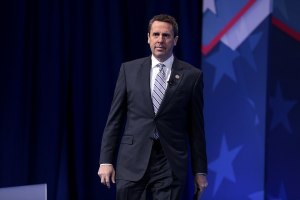Time to 'Get Real' about Roosevelt's 'New Deal'
My parents lived through the Great Depression. Since I was old enough to care or understand my parents, my teachers, and the mainstream media told me that Franklin Roosevelt rescued America from certain economic destruction by implementing something called "The New Deal." The conventional spin about the Great Depression goes something like this. The Hoover administration (Herbert Hoover was a Republican, Roosevelt a Democrat) created the depression by looking the other way while the financial markets engaged in overinvestment, under consumption, gross mismanagement, and downright malfeasance, which created an economic bubble that burst on October 29, 1929. The crash of the stock market in the United States sent financial shock waves around the world, pulling in country after country until the entire world found itself in the icy grip of depression.
In many people's minds, FDR's election in 1932 was the first ray of light to penetrate the darkness of the depression. In his first inaugural address, Roosevelt began by addressing the moral causes of the depression but quickly transitioned into what the government must do to fix the problem. Roosevelt's transition statement was "Restoration calls, however, not for changes in ethics alone. This Nation asks for action and action now." The action he proposed included using the government to put people to work and to enact new regulations over the financial markets. Roosevelt called for "national planning and supervision of all forms of transportation and of communications and other utilities which have a definitely public character." In other words, he called for heavy government involvement in spending to rebuild the infrastructure of America. In order to achieve these goals, Roosevelt acknowledged, "It is to be hoped that the normal balance of executive and legislative authority may be wholly adequate to meet the unprecedented task before us. But it may be that an unprecedented demand and need for undelayed action may call for temporary departure from that normal balance of public procedure."
That "temporary departure" manifested itself in what amounted to the nationalization of the work force. Under Roosevelt, the government created the Works Project Administration (WPA), the National Recovery Administration (NRA), the Agricultural Adjustment Administration (AAA) and the Tennessee Valley Authority (TVA) just to name a few. All of these examples of heavy government involvement in the private sector have long been held up as shining examples of what government can do when it aggressively moves into the private sector.
But was the New Deal the success it has always been touted by the Left to be? I think it is important to know the answer to that question since President Barack Obama is calling for the same quick action by the government. His economic stimulus proposal that he wants passed with broad bipartisan support and little debate would dwarf the New Deal in the scope of its extended government control into the private sector and its price tag (currently estimated at one trillion dollars).
The cold hard facts about the New Deal are as follows. In 1931, the national unemployment rate stood at 17.4%. In 1938, five years after FDR introduced the New Deal, the unemployment rate was 17.4%. This is after five years of doubled federal spending and virtually hundreds of new government programs that reached deep into the private sector. The median unemployment rate from 1934 to 1940 was 17.2%. In 1941, as World War II began, the unemployment rate stood at 9.9% and the living standards of most Americans remained depressed until after the war. So, by any standard of measurement it can be said that FDR's New Deal failed to change the lot of the average American worker.
What about other measuring sticks used to monitor economic recovery? For example, did the stock market recover as a result of the New Deal? Hardly…the Dow Jones Industrial Average, which had been as high as 343 just prior to the crash, hit 250 in 1930 (while Hoover was still president). In January of 1940, after seven years of New Deal policies and an unprecedented expansion of government control the Dow Jones Industrial Average had collapsed to 151. This occurred after the government had expanded its control of the total economy during the same time period by an astonishing 360 percent! The Stock Market did not return to its pre-crash value until well into the 1950's.
Finally, it should be noted that while the Great Depression was worldwide in scope, the United States was one of the last nations to emerge from its effects. Economic historian Lester V. Chandler noted, "In most countries the depression was less deep and prolonged." Even the Brookings Institute, a left-leaning think tank, produced a nine hundred-page report that concluded that the National Recovery Program "on the whole retarded recovery."
Governments cannot spend themselves into prosperity. The best that they can do is take the wealth that is produced in a free-market, capitalist society and redistribute that wealth according to the prevailing political philosophy of the day. Right now, it appears our economic recovery plan consists of borrowing trillions of dollars against the prosperity of future generations in order to stave off disaster when history teaches us that it is a plan that just won't work.
So, what can be done to get us out of the mess we have created for ourselves? Do we really need a new, "New Deal" that includes massive debt and unrestrained government involvement in our daily lives?
King Solomon new something about economies. He was the wealthiest man ever to live and the wealth Israel enjoyed under his leadership was unprecedented and unparalleled. He lived by economic principles that are lost in today's world. "The rich rules over the poor, and the borrower becomes the lender's slave"(Proverbs 22:7). Solomon also said, "He who increases his wealth by interest and usury gathers it for him who is gracious to the poor"(Proverbs 28:8). And, "Great wealth is in the house of the righteous, but trouble is the income of the wicked"(Proverbs 15:6). Solomon's formula for prosperity was a combination of right living and prudent economic decisions.
What will America do? Will we return to the failed policies of the past or will we come to our senses and allow God's principles of financial stability be the formula for real economic recovery? For all of our children's sake I pray for the latter.





























